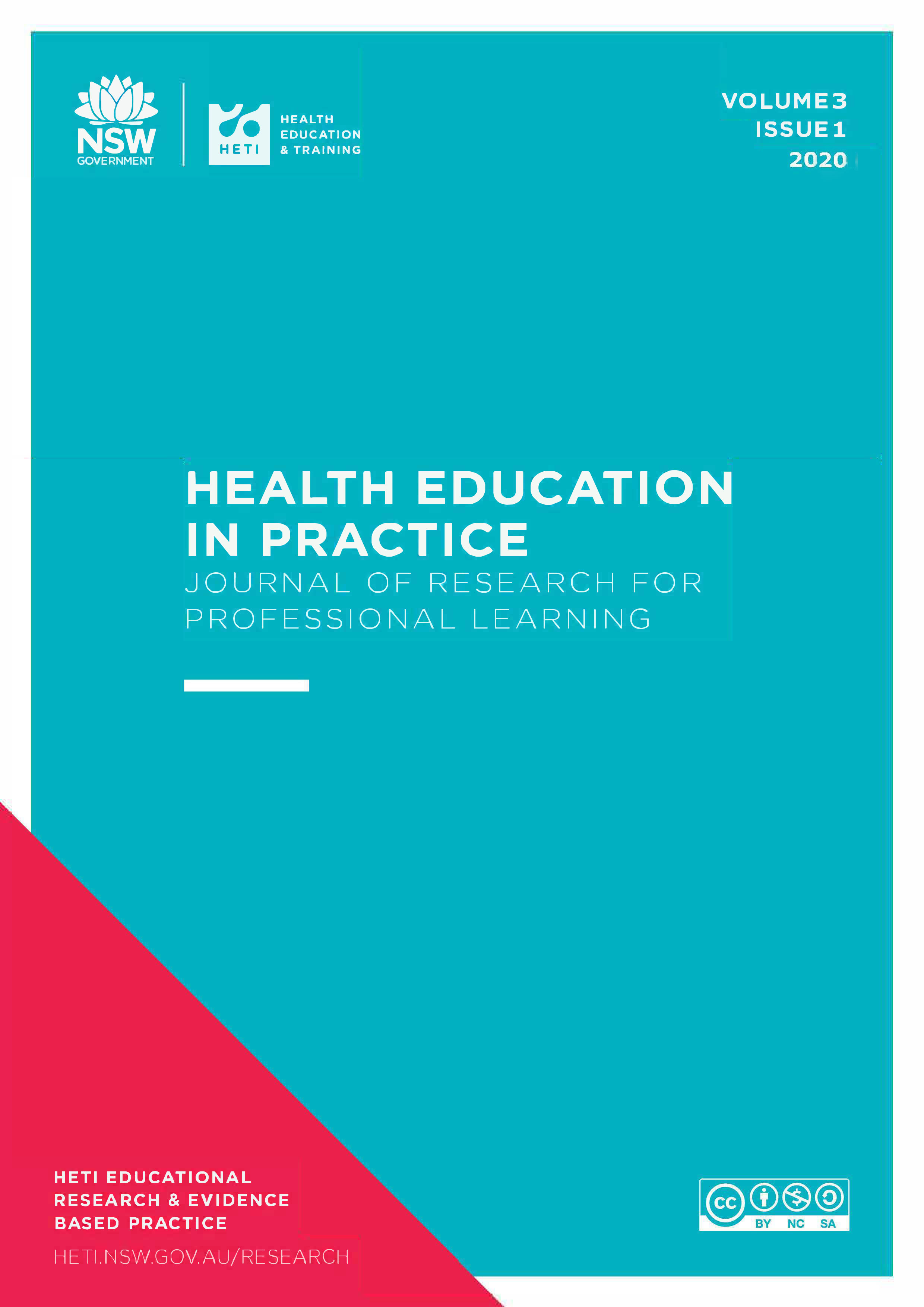Exploring student fitness to practise (FTP) issue identification and management with allied health clinical educators in a tertiary health service
DOI:
https://doi.org/10.33966/hepj.3.1.14189Abstract
Background: Health professional students may experience fitness to practise (FTP) issues that affect their performance during clinical placements. Previous research with physiotherapy clinical educators found educators were aware of student FTP issues but lacked confidence in assisting students with FTP issues in the clinical setting.
Aim: This research project aimed to 1) evaluate if a brief interprofessional education session changed the knowledge of supports and/or confidence of allied health clinical educators to manage student FTP issues that arise on clinical placement, 2) to elucidate personal experiences of allied health clinical educators with student FTP issues and 3) to explore allied health educator recommendations of strategies to use when supporting students on clinical placement.
Method: Allied health clinical educators attended a 1.5-hour workshop about student FTP. Participants identified student FTP issue identification and management strategies during clinical placements and completed pre-post surveys. Quantitative and qualitative data were analysed with independent t-tests, content and thematic analysis respectively.
Results: Forty-six clinical educators from nine professions participated. Participants initially lacked confidence and identified a need for training to support students with FTP issues. On reflection participants identified numerous strategies that use or recommend to support students with additional learning needs, and confidence increased following the session.
Discussion: A brief facilitated workshop had an immediate impact on clinical educator confidence regarding defining FTP and knowledge of supports available. Participants offered several experience informed insights and recommendations that build on a previous study of physiotherapy clinical educators.
Conclusion: A brief education session with an interprofessional group of allied health clinical educators elucidated a number of important strategies to consider when supporting students with FTP issues in the clinical setting.
Downloads
References
Bearman, M., E. Molloy, R. Ajjawi and J. Keating (2012). "‘Is there a Plan B?’: clinical educators supporting underperforming students in practice settings." Teaching in Higher Education: 1-14.
Braun, V. and V. Clarke (2006). "Using thematic analysis in psychology." Qualitative Research in Psychology 3(2): 77-101.
Forsetlund, L., A. Bjørndal, A. Rashidian, G. Jamtvedt, M. A. O'Brien, F. Wolf, D. Davis, J. Odgaard-Jensen and A. D. Oxman (2009). "Continuing education meetings and workshops: effects on professional practice and health care outcomes." Cochrane Database Syst Rev 2(2).
Gerdtz, M., C. Daniel, V. Dearie, R. Prematunga, M. Bamert and J. Duxbury (2013). "The outcome of a rapid training program on nurses’ attitudes regarding the prevention of aggression in emergency departments: A multi-site evaluation." International Journal of Nursing Studies 50(11): 1434-1445.
Graneheim, U. H. and B. Lundman (2004). "Qualitative content analysis in nursing research: concepts, procedures and measures to achieve trustworthiness." Nurse Education Today 24(2): 105-112.
Lo, K., H. Curtis and A. F. Cracknell (2017). "Exploring student fitness to practise in physiotherapy – strategies from the coalface." New Zealand Journal of Physiotherapy 45(2): 59-66.
Lo, K., H. Curtis, J. L. Keating and M. Bearman (2017). "Physiotherapy clinical educators’ perceptions of student fitness to practise." BMC Medical Education 17: 16.
Lo, K., S. Maloney, M. Bearman and P. Morgan (2014). "Proactive student engagement with fitness to practise." Journal of Biomedical Education 2014.
Mertens, F., E. de Groot, L. Meijer, J. Wens, M. Gemma Cherry, M. Deveugele, R. Damoiseaux, A. Stes and P. Pype (2017). "Workplace learning through collaboration in primary healthcare: A BEME realist review of what works, for whom and in what circumstances: BEME Guide No. 46." Medical Teacher 40(2): 117-134.
Miles, M., A. M. Huberman and J. Saldaña (2014). Qualitative data analysis: A methods sourcebook, Sage: Los Angeles.
Parker, M. (2000). "Assessing medical students' professional development and behaviours : a theoretical foundation." Focus on Health Professional Education: A Multi-disciplinary Journal 2(2): 28-38.
Parker, M. (2006). "Assessing professionalism: theory and practice." Medical Teacher 28(5): 399-403.

